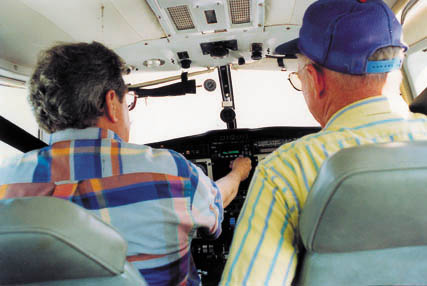

I F(ollow) R(oads)
by Patricia Mattison
|
I wish I had a nickel for every time I've heard a local pilot say, "I don't need an instrument rating. I never fly unless it's VFR (Visual Flight Rules)." Okay, so you try to stay VFR. But how many of us have set out to fly in marginal weather only to find ourselves accidentally in instrument meteorological conditions (IMC) in which Instrument Flight Rules (IFR) apply? Reflect a little and I'll bet that you are hard pressed to deny that this has happened to you. There you are, flying along, happy as a clam in muck, when the ceiling that has been getting lower and thicker suddenly lets go with a snow shower or rain. Visibility dwindles to almost nothing, and you tell yourself that you'll just fly straight ahead for a few seconds and be out of the shower. Fat chance. Murphy's Law is alive and well. When was the last time you considered the real meaning of zero-zero? How long has it been since you practiced your instrument approaches with a safety pilot? How long has it been since you practiced flight by reference to instruments with a flight instructor? You answer, "A long time," or "When I got my pilot certificate some years ago," or "Just enough to get my private pilot certificate." I've heard them all. |
 |
As a Private Pilot applicant you must be able to fly sufficiently by reference to attitude instruments so as to exit adverse weather. Does the Practical Test Standards, the examiner's guide for the pilot practical test, give a number of flight hours necessary? Is a given number of hours of flight by reference to attitude instruments required? The answer is "No" to both.
Say that your flight instructor for the private certificate gave you three hours of instruction by reference to instruments before you took your check ride. That was five or 10 years ago. During your last Flight Review you did everything VFR. Now you find yourself smack dab in the throes of a storm. You have no Instrument rating in your pocket, and it's been a long time since you experienced the feel of IFR flight. You are in for a heart-stopping experience indeed!
When weather goes to heck in a hand basket and you find yourself in instrument conditions, it is comforting to have all the instruments you can have and the knowledge to use them. One of the major causes of accidents in the U.S. is inadvertent flight from VFR into IFR weather. Most of those accidents involve VFR-only pilots who are flying aircraft that may not be equipped for IFR flight operations. Even though some aircraft have all the instruments required for IFR flight, some aircraft owners may have been lax in keeping current all the appropriate pitot static checks, etc.
The rationale in some locations is that a pilot never flies a light aircraft unless the weather is VFR. That may be true to an extent.
Most flights start out VFR, and most successfully end VFR. But the amount of time and money spent getting an Instrument certificate will be worth it.
| ŠAvStop Online Magazine Contact Us Return Home |